Last updated on February 14th, 2024 at 02:21 pm
Shopify has become one of the most popular e-commerce platforms worldwide, empowering entrepreneurs to easily set up online stores and sell their products.
With an estimated 4 million stores globally, Shopify offers a turnkey solution for starting an eCommerce business.
Shopify is also gaining significant traction in South Africa as local entrepreneurs and small businesses look to tap into the country’s growing online retail sector.
Selling on Shopify enables South African merchants to establish a professional online storefront and leverage Shopify’s extensive features for managing and growing the business.
Shopify handles the technical aspects like hosting, security, and scalability, while merchants can focus on selecting products, customizing their online store, and connecting with customers.
One of the biggest advantages of using Shopify in South Africa is its relatively low cost and ease of setup compared to other solutions.
The basic Shopify plan starts at $32 per month and can be set up in just a few hours.
The platform is intuitive and easy to manage, even for those without extensive technical skills.
This makes Shopify highly accessible for aspiring online entrepreneurs and SMEs in South Africa looking to establish their first e-commerce storefront.
Table of Contents
Benefits of selling on Shopify in South Africa
There are several key benefits to selling on Shopify for merchants based in South Africa:
Low Costs
One of the biggest advantages of Shopify is the relatively low cost to get started compared to other ecommerce solutions and platforms.
Shopify offers competitive pricing starting at $32 per month for the basic Shopify plan.
There are no bandwidth or transaction fees, with only payment processing costs.
This presents a very affordable way for entrepreneurs and SMEs in South Africa to establish their first online storefront.
The low costs allow merchants to test ideas and bring products to market without heavy investment upfront.
Quick and Easy Setup
A Shopify store can be set up in just a few hours with no technical skills required.
The Shopify platform handles all the technical aspects like hosting, security, and scalability.
Shopify’s intuitive dashboard and themes make it easy for South African merchants to customize the look and feel of their online storefront.
This enables entrepreneurs to have their business online and start selling faster.
Built-in Features
Shopify in South Africa offers a wide range of built-in features to help merchants manage their operations and grow their business.
Key features include secure payment processing, shopping cart and checkout, shipping and fulfilment integration, inventory and order management, analytics and reporting.
South African merchants can leverage these robust tools to simplify eCommerce operations, saving time and money.
Mobile Commerce Ready
South Africa has a high mobile commerce usage with 60% of online sales in 2021 coming from mobile devices.
Shopify stores are optimized for mobile shopping providing merchants the ability to tap into this key demographic.
The mobile commerce capabilities make it easy for South African consumers to discover and purchase products on-the-go.
Support and Community
Shopify offers 24/7 customer support along with an extensive library of guides and resources for merchants.
The Shopify community forums enable South African merchants to connect with and learn from other Shopify users in the country.
The availability of support and an engaged community helps merchants successfully navigate the challenges of building their ecommerce business.
Overall, the combination of low cost, robust features, mobile readiness and available support makes Shopify an attractive e-commerce platform for merchants in South Africa.
The benefits empower entrepreneurs to turn their ideas into successful online businesses and tap into the country’s expanding ecommerce market.
How to set up a Shopify store in South Africa
Here are the key steps South African merchants need to take to set up their Shopify online store:
Sign Up For Shopify

The first step is to go to Shopify.com and sign up for a Shopify account.
You can start with the 14-day free trial to test out the platform.
When ready to launch, you can pick one of the monthly pricing plans – Basic Shopify, Shopify, or Advanced Shopify.
Consider transaction volume and features needed to determine the best plan.
Choose a Business & Store Name
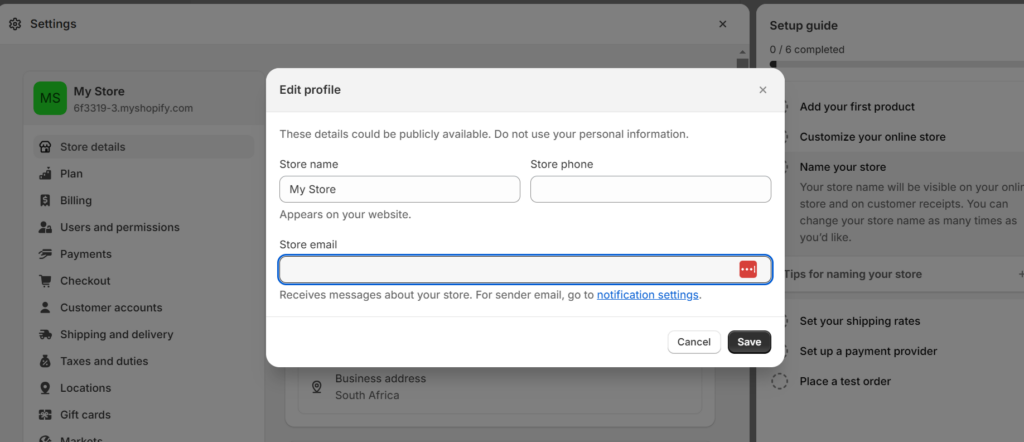
You will need to choose your business or store name when signing up.
Check availability to ensure your preferred name is available and reserves it.
Your store name will form part of the custom URL, e.g, yourstore.myshopify.com.
You can also purchase a custom domain when ready.
Customize Store Theme
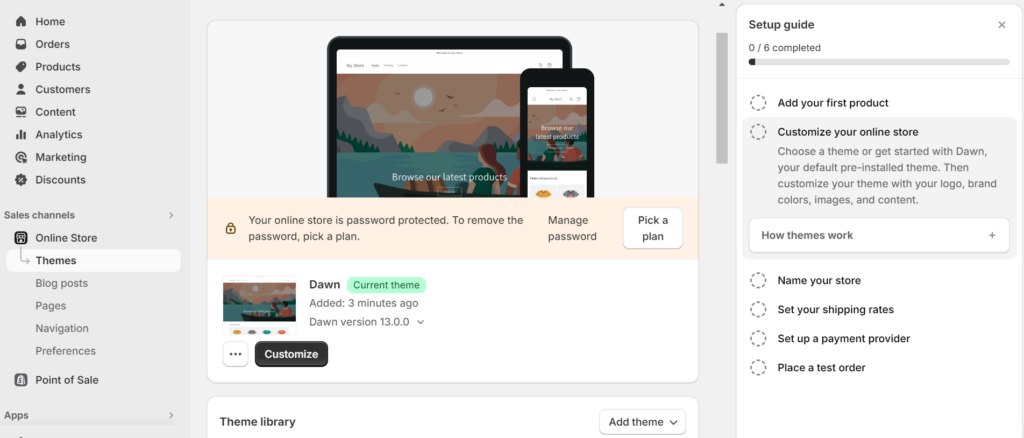
Shopify provides a variety of professionally designed themes and templates to easily customize the look and feel of your online store.
Browse the theme store and pick one aligned to your brand image.
Customize colors, fonts, layout as needed to create your unique storefront.
Configure Settings
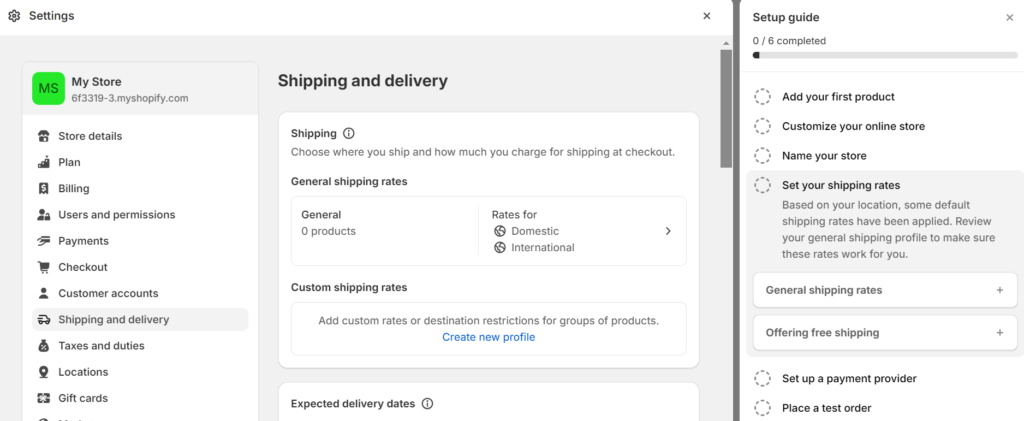
Configure your general store settings like checkout, taxes, currency formatting, shipping zones.
Connect your payment provider & shipping carriers.
Having these basics set up ensures a smooth customer checkout experience.
Add Products & Inventory
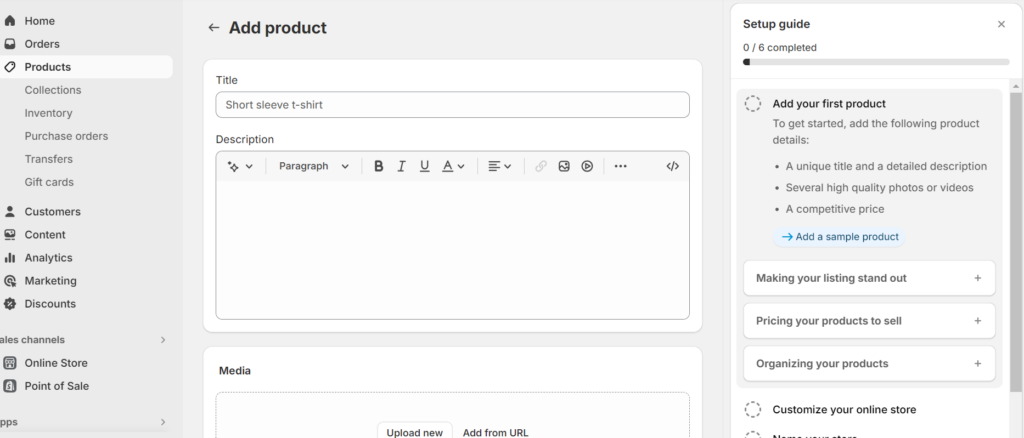
You can start adding products to your store manually or import inventory using the CSV product import tool.
Add product descriptions, images, pricing and track inventory quantities.
Use Shopify’s rich product editing features to showcase your items attractively.
Read also:
- 11+ Best Things You Can Sell Online in South Africa
- Dropship Products South Africans Can’t Get Enough Of
Set Up Payments
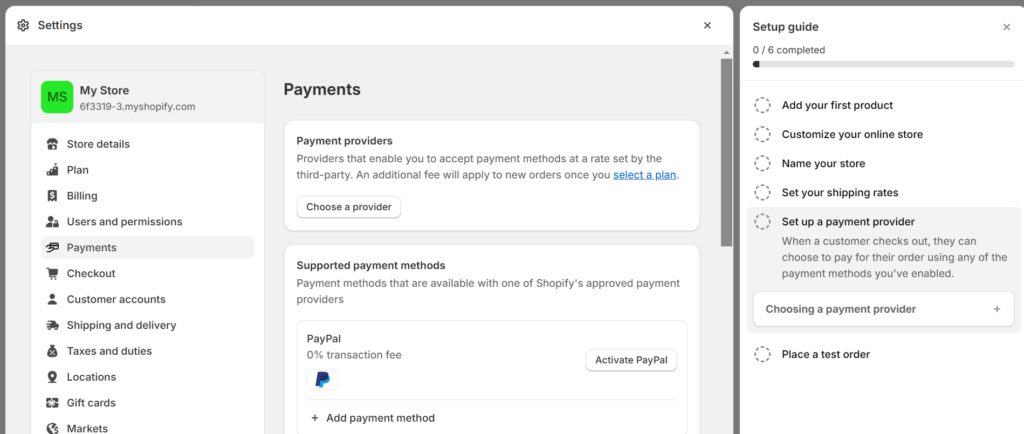
Shopify integrates with all major South African payment gateways like PayFast, DPO PayGate, Pesapal.
Sign up with your preferred provider and connect your account to your Shopify store to start accepting payments.
Configure settings like accepted currencies, payment terms etc.
Review Legal Requirements
Ensure your Shopify store meets South Africa’s legal requirements like consumer protection laws, return policies, terms of service etc.
Shopify provides resources to guide you through the process including useful templates.
With these steps completed, your Shopify store will be ready to launch in South Africa!
Ongoing optimization for growth can then be done through marketing, expanding product catalog, improving purchasing experience etc.
Setting up payments and tax compliance in South Africa
Operating a Shopify store in South Africa requires proper tax setup and compliance.
Here are some tips on managing taxes for your Shopify business:
VAT Registration
If your Shopify store’s annual turnover exceeds R1 million, you must register for VAT with SARS.
To register, complete the VAT101 form and submit to SARS along with supporting documents like bank statements, tax clearance certificate etc.
Once registered, you’ll receive a VAT number that must be displayed on invoices.
All prices on your Shopify store should now include 15% VAT. Ensure your store settings automatically calculate VAT on checkout.
Tax Compliant Invoicing
Shopify provides built-in tools to generate tax-compliant invoices including:
- Your business name, address and contact details
- VAT number
- Customer name and address
- Invoice number
- Date of transaction
- Description of goods
- VAT amount
Set up a sequential invoice numbering system.
Download invoices in PDF format and email automatically to customers at checkout.
Maintain digital copies for your records.
VAT Reporting
As a VAT vendor, you must submit VAT returns to SARS every 1-2 months.
Shopify has integrations with tax apps like Taxamo that can automatically generate VAT reports with sales data from your store.
This takes care of your VAT filing obligations.
Withholding Taxes
For transactions with international customers, be aware of potential withholding taxes like CGT and dividend tax.
Consult an accountant to ensure proper declarations and payments are made.
Tax Deductible Expenses
Many Shopify store expenses are tax deductible – subscriptions fees, payment processing fees, shipping supplies, advertising etc.
Maintain proper records like invoices and receipts to claim deductions when filing tax returns.
Proper VAT compliance and accounting makes operating Shopify stores seamless in South Africa.
Consider enlisting an accountant to assist with tax registrations, returns and advisory. This allows you to focus on growing your online business.
Marketing a Shopify store in South Africa
Marketing is essential for any Shopify store to drive traffic, generate leads and increase sales.
Here are some effective marketing tactics South African merchants can use to promote their Shopify store:
Search Engine Optimization
SEO establishes authority and generates organic traffic from Google and other search engines.
Important elements for Shopify SEO include:
- Compelling page titles and meta descriptions
- Optimized content and images (alt text and file names)
- Fast page speed
- Mobile responsive design
- Internal linking structure
- Backlinks from related websites
The Shopify SEO app provides useful tools to audit your site and identify optimization opportunities.
Focus on creating content that targets relevant buyer keywords and answers search intents.
Social Media Marketing
Actively engage with your audience on social platforms like Facebook, Instagram, X, and YouTube.
Create social media marketing campaigns to:
- Increase brand awareness
- Showcase products
- Run contests and promotions
- Share content, visuals and videos
Leverage influencer marketing by partnering with relevant social media influencers.
Use targeted Facebook and Instagram ads to reach local demographics.
Email Marketing
Collect customer emails and send campaigns via email marketing platforms like MailChimp.
Send promotional, educational and transactional emails.
Offer incentives like discounts or free shipping for subscribers.
Send cart abandonment reminders and customize recommendations based on purchase history.
Influencer Marketing
Partner with social media influencers, bloggers and industry experts to promote your products.
Offer free products in exchange for reviews and social shares.
Guest blog posts and expert interviews also provide great exposure.
Paid Ads
Google Shopping campaigns feature your products in relevant search results.
Retarget shoppers with Google/Facebook remarketing ads.
Instagram shopping ads drive impulse purchases.
Consider paid ads to accelerate growth.
A strategic marketing plan combining organic and paid tactics will amplify your Shopify store’s visibility and drive sales in South Africa’s competitive eCommerce landscape.
Shipping and fulfillment considerations for South Africa
Shipping and fulfilment are critical considerations when selling online in South Africa.
Choosing the right solutions can make the difference between a seamless or frustrating customer experience. Here are some tips for Shopify merchants:
Delivery Partners
Partner with recognized delivery companies for reliable shipping like the Post Office, Fastway, FedEx, DHL, Ox Couriers.
Offer options like regular post, overnight and courier depending on product and budget.
Provide accurate delivery estimates and tracking visibility.
Integrate with partners via Shopify’s shipping apps for label printing and status updates.
Offer collection from store if logistically viable.
Locations & Coverage
Assess what locations you can feasibly deliver to based on your fulfillment capability.
Many online retailers in South Africa start with coverage across major cities then expand nationwide.
Be transparent about where you deliver to avoid disappointments.
This avoids overpromising then underdelivering. Expand locations once operations are running smoothly.
Shipping Rates
Calculate accurate shipping rates based on factors like order weight, delivery speed and location.
Enable location-based rates on Shopify.
Pass on actual carrier costs to avoid losing money – don’t absorb shipping costs unless used as a promotion.
Consider offering free shipping above order value thresholds.
This incentivizes bigger basket sizes and conversion. Just ensure to build the costs into your pricing strategy.
Packaging
Invest in quality packaging materials like boxes, bubble wrap, tape etc.
Professional packaging minimizes damages and improves customer experience.
Reuse packaging from your own suppliers and purchases first before buying all new materials.
Pass any big savings from recycled packaging to your customers.
Warehouse & Pick/Pack
Unless you have your own warehouse and fulfilment team, outsource to 3PL (third-party logistics) providers like Takealot Fulfillment Services.
This handles warehousing, inventory management, packing and shipping on your behalf.
For DIY fulfilment, use your garage or spare room to store inventory and pack orders.
Take advantage of Shopify apps to manage and multichannel sync your product inventory across selling platforms.
Delighting customers with quick, affordable delivery will boost satisfaction, retention and word-of-mouth for your Shopify store in South Africa.
Key Takeaways
Shopify enables entrepreneurs in South Africa to easily set up ecommerce stores with its affordable plans and robust built-in capabilities.
The platform makes it fast and simple to build a professional online storefront to start selling.
Benefits like low costs, quick setup, and mobile commerce optimize Shopify for the South African market.
These factors make Shopify accessible for SMEs looking to tap into the country’s growing online retail sector.
Following local legal requirements around VAT, taxes and consumer protection makes Shopify stores compliant to operate in South Africa.
Tools like automated VAT reporting streamline regulatory processes for merchants.
Marketing across search, social, email and influencers is key for Shopify stores to drive traffic and sales.
A mix of organic and paid tactics helps amplify brand visibility in South Africa’s competitive eCommerce space.
Thoughtful approaches to shipping and fulfilment enhance the customer experience and satisfaction.
Choosing reliable delivery partners and optimizing logistics and packaging removes buying friction.
Read also:
